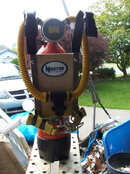Why always fundamentals from gue? It is not bad, but it is not better than other courses. Of course you have a difference in instructors, but if the instructor is not a person you fits your character, then you will never learn a lot, not with gue, not with iantd and not with tdi or even padi. I have done all courses from tdi and iantd and that was really good, and costet less. I don't want to startover again. And I know I will get a tech rating on fundies if I would do that course. So no, for me no need and a waiste of money. When I did the art course, I was thinking about a fundies class, but decided not to do. I had only to do normoxic and full trimix and that would cost me around 1500. So why spend then first a 700 to do fundies (only to show you can get a techrating), and then 1200 for tech1 (which is almost same as art), and then tech2 for 2000 and you go only to 75m, where you go with a good instructor on your full trimix course from another organisation go to 85-100m. So I decided to follow the iantd way. And I loved it. And I can still dive DIR, but I can use non-standardgases as well. A gue fundies will cost here 700, that are only 8 dives of about 40-45 minutes. Not cheap per hour as well (theory and equipment setup is for me bull**** as I have all DIR-standarized already, so I get only 8 dives for that 700 euro, so too much per hour for what you get in my eyes).
You cannot compare the prices of diving to a private hour with horseriding. I do horseriding too and then you pay a lot for a really good instructor for a private lesson. BUT: you only take a lesson if needed. And in diving you have to take a whole course to show that you can dive on that level. In riding you can do competitions without any lessons taken and the points you get from the judges can make you to go a level higher. No instructor needed. The autodidact can do all without lessons or just a few lessons needed. In diving the autodidact does not fit. I know there a rule in GUE where you can proof that there is no need to do a specific course. But if you contact an instructor to show that you have that level, then they don't react, always busy. I have done a lot of dives over tech2 level (75m to 112m) and have done even more dives on eCCR on and over the mod3/full trimix level, and have done a lot overhead as well, so why would I do any DIR course? I decided to spent my money on getting more experience in such dives. And yes, I am really precise in what I am doing. I try to improve always, use pictures and movies etc. to improve myself.
So yes, I like DIR on oc, but for really experienced divers there is no need to start over again. You can do DIR without a course. It is not a secret feature or something special. It is a way of diving, and it fits your or not. And for me it fits not always. If you are less experienced, then maybe a fundies course can be nice. It is not bad, and if the instructor is a nice person then you can learn a lot. But you have UTD too and the Essentials from IANTD.
Oh, brass double enders work really well. I have some and decided to use them till I had to replace for stainless steel. And even after more than 500 dives, the brass ones still work, haha. Oh and my Halcyon backplate is on my ccr. The halcyon webbing and a selfmade backplate is on my oc equipment. I have a halcyon wing of 40lbs, nice in caves or up to 2 stages, but too small if you dive in currents with 4 stages. For that dives I have a horseshoe wing of 60lbs from DIR-zone which I use with a steel twin12. Regs are from Aqualung (stageregs, now not DIR anymore, because I made an inflator hose on it for my CCR, but it works nice as well on oc) , Scubapro and Apeks. My hoses for the stageregs are maybe non dir (but GUE does not write all must be black), I have green hoses, yellow, pink, red, purple. And I like the yellow 'octopus' regs. So I use them instead of black ones. Regs are the same but a better colour.

yes, I do stagerotations, use a leash when carrying more than 2 stages. BUT: in cold waters with 3 fingergloves (I don't like drygloves), then sometimes I carry stages left-right, so non-dir because that is easier.





